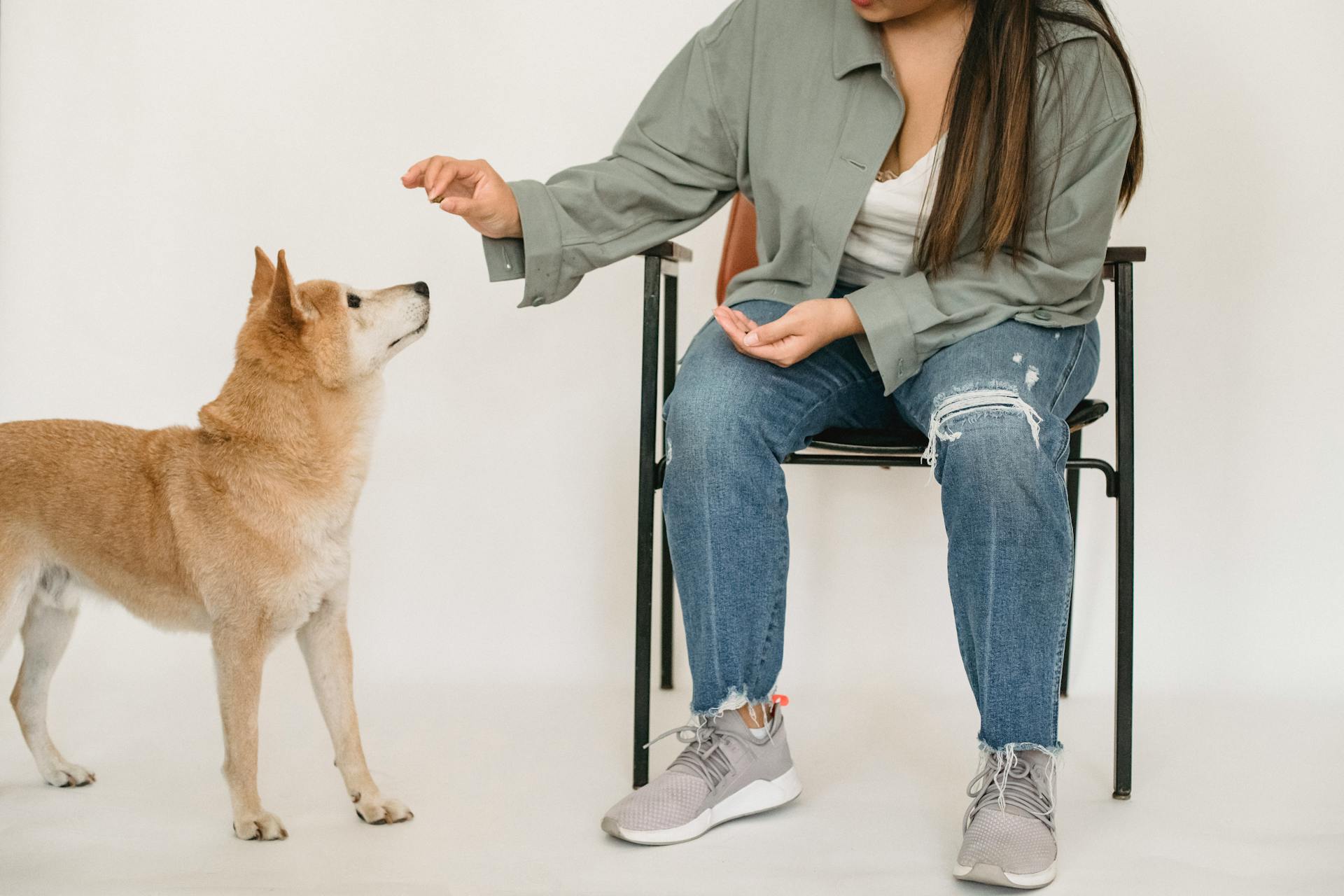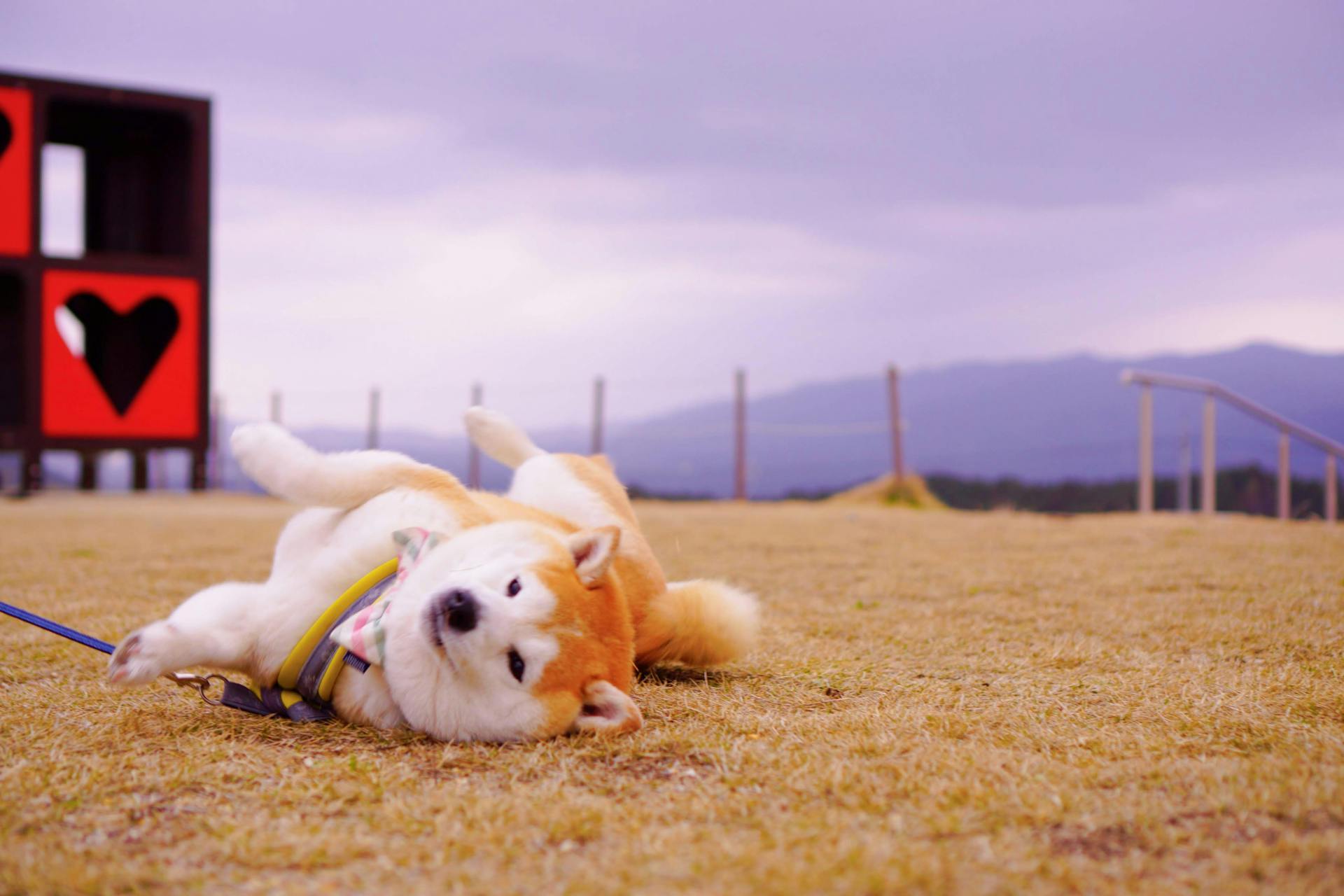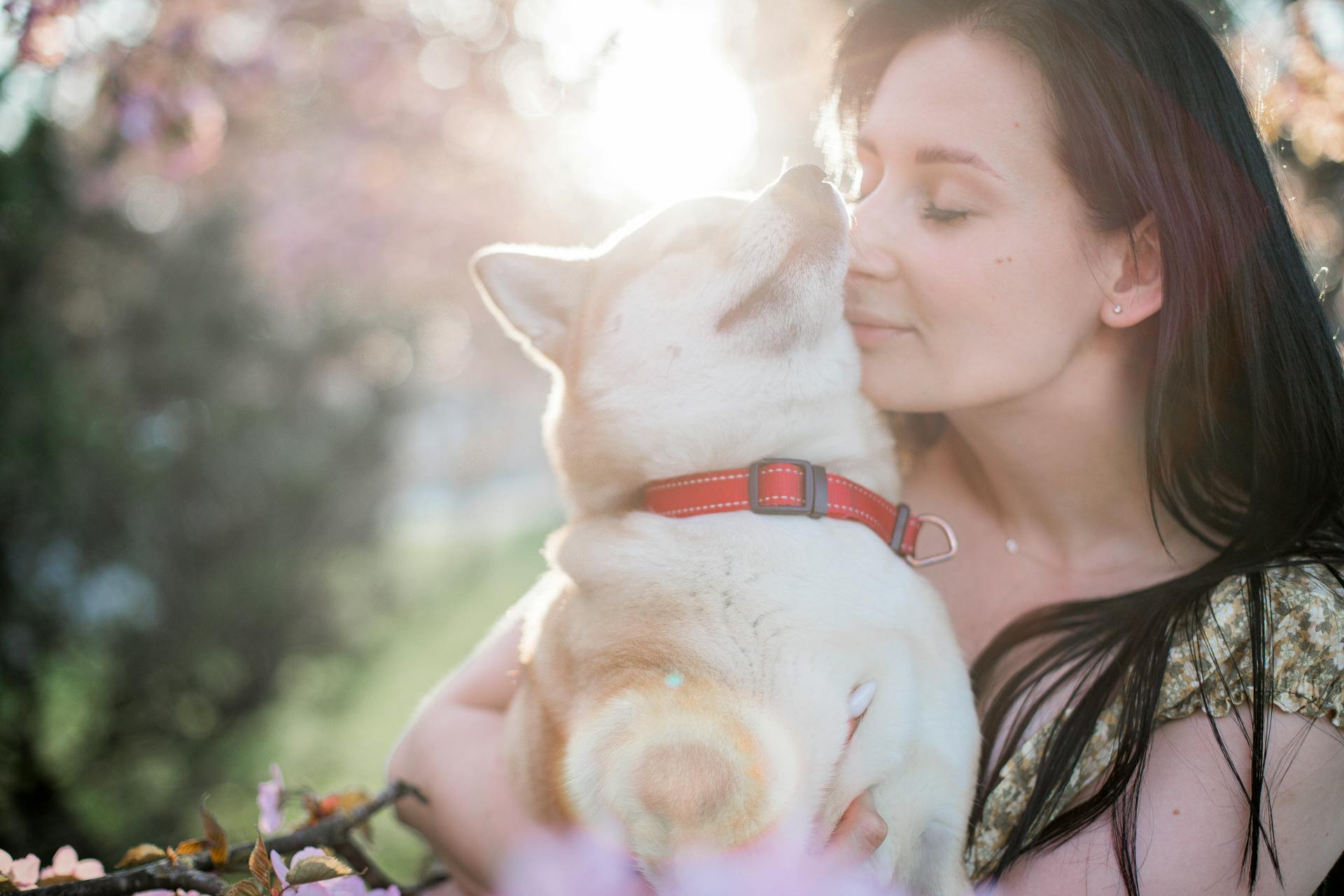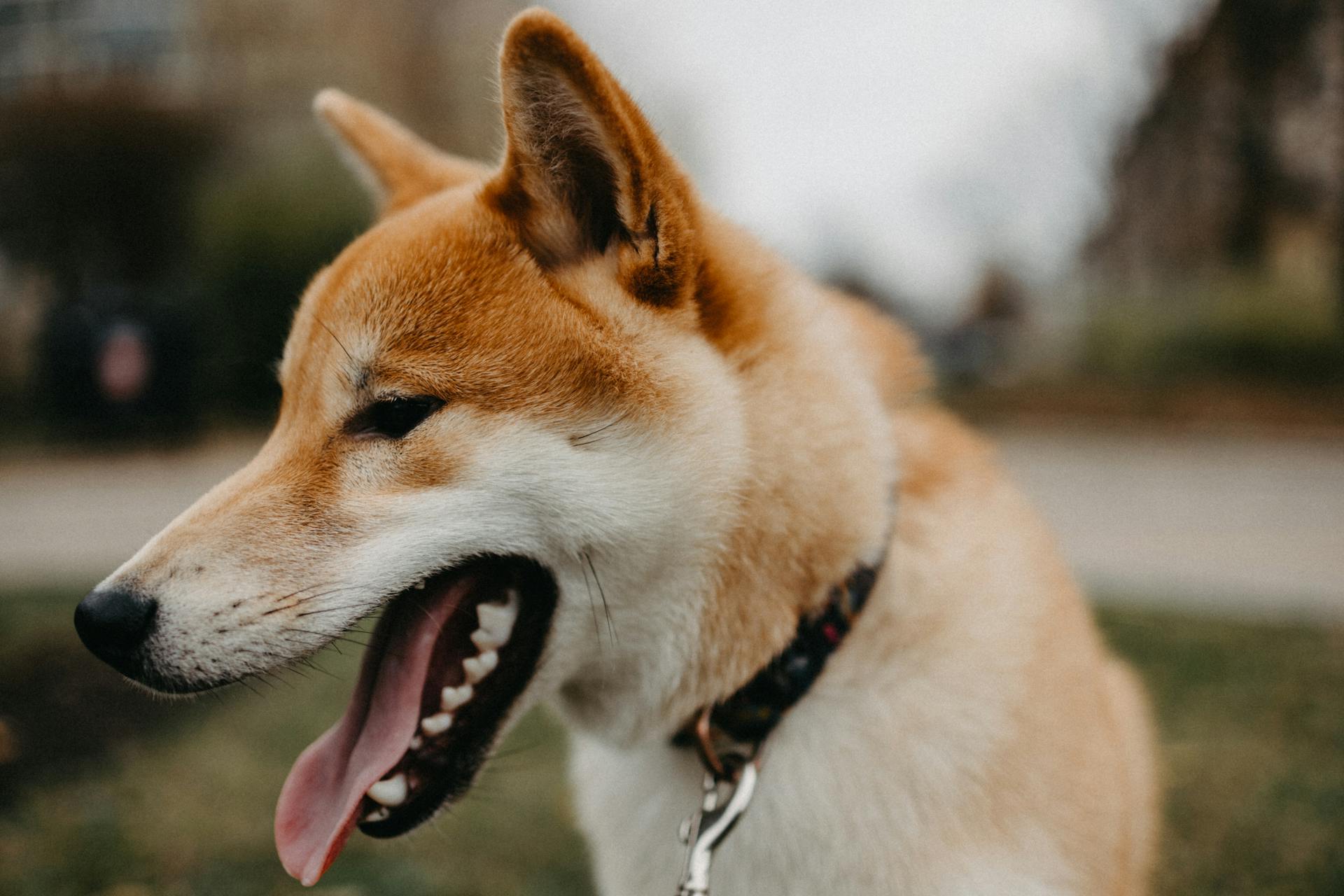
As a first-time Shiba Inu owner, you're probably wondering what to expect in terms of maintenance. Shiba Inus are known to be a relatively low-maintenance breed, but they still require regular care to stay happy and healthy.
Their coats require regular brushing to prevent matting and tangling, which should be done at least twice a week. Regular nail trimming is also essential to prevent overgrowth.
Shiba Inus are prone to certain health issues, such as hip dysplasia and eye problems, so regular veterinary check-ups are crucial to catch any potential issues early on.
Consider reading: Health Issues with Shiba Inu
Temperament and Training
Shiba Inus are highly intelligent dogs that require plenty of mental stimulation to avoid boredom. They have a strong prey drive and hunting instinct, which means they'll often chase anything that moves, making recall training essential.
A Shiba Inu's strong-willed nature can make training a challenge, but it's not impossible. With patience and consistency, you can teach them to focus and follow commands.
A fresh viewpoint: Shiba Inu Training
Shibas need between 40 and 60 minutes of exercise every day to satisfy their energetic personalities. This should include off-lead activity in a safe, enclosed area, as they are expert escape artists.
A lively and attentive personality makes for a great ball game partner, and including ball games in your training can help improve their recall training without boring them. Try hiding food treats around the garden to encourage problem-solving and hunting instinct.
Shiba Inus are naturally good-natured and loving companions, but they can be quite vocal and have a tendency to yodel when they want attention. They also make a high-pitched scream when they become excited.
To set boundaries with your Shiba Inu, it's essential to adopt an unaggressive alpha role early on. This will help them understand who's in charge and prevent dominant behavior.
Here are some exercise and training tips for your Shiba Inu:
- Provide daily "scent walks" to allow them to sniff and explore.
- Include ball games and problem-solving activities in your training.
- Make sure they get plenty of mental stimulation to avoid boredom.
- Exercise them for 40-60 minutes every day, including off-lead activity in a safe area.
Health and Nutrition
A Shiba Inu's health and nutrition are crucial for maintaining their compact body shape and preventing potential health issues. Your Shiba's nutrition plan should be appropriate for a small but active dog, and it's essential to choose good quality food in the right sized portions to avoid overfeeding.
Consider reading: Japanese Chin Dog Health Problems
Shibas will thrive on a balanced diet of good quality, dry dog food that contains all the necessary minerals and proteins. To ensure you're providing the best nutrition for your Shiba, it's best to measure out their food to maintain a healthy weight.
A Shiba Inu's diet should be designed with glucosamine for joint support and increased fatty acids for skin support. You can feed your Shiba a diet approved by the Association of American Feed Control Officials (AAFCO), which ensures the food has the standard ingredients and nutritional components for a balanced diet.
Here are some general guidelines for feeding your Shiba Inu:
Remember to always consult with your veterinarian to determine the best feeding plan for your Shiba Inu based on their current weight, health history, and lifestyle.
General Health Information
Brushing your dog's teeth daily can prevent periodontal disease. This is a common health issue in Shiba Inus, and it's essential to start brushing their teeth when they're a puppy so they become accustomed to it.
If this caught your attention, see: Shiba Inu Teeth
Shiba Inus are prone to dental disease, which can lead to tartar build-up on their teeth and progress to infection of the gums and roots of the teeth. If left untreated, this can cause your dog to lose their teeth and even damage their kidneys, liver, heart, and joints.
Daily brushing, along with regular dental cleanings by your veterinarian, can help prevent dental disease. It's also crucial to keep an eye out for signs of dental problems, such as bad breath, yellow or brown teeth, or red and swollen gums.
In addition to dental care, regular veterinary check-ups are essential to monitor your Shiba's overall health. Your veterinarian can perform annual screenings to detect potential health issues, such as hypothyroidism, which can cause dry skin and coat, hair loss, and weight gain.
A balanced diet and regular exercise are also vital for maintaining your Shiba's overall health. A good-quality joint supplement containing glucosamine can help slow the development or progression of joint problems, especially in Shiba Inus prone to patella luxation.
Remember to consult with your veterinarian before giving your Shiba any supplements, and never give them without guidance. By following these simple tips and staying on top of your Shiba's health, you can help them live a long and happy life.
Parasites
Parasites can be a serious concern for our furry friends, causing pain, discomfort, and even death. Everything from fleas and ticks to ear mites can infest your Shiba's skin and ears.
Hookworms, roundworms, heartworms, and whipworms can get into your dog's system through contaminated soil, unclean water, or being bitten by an infected mosquito.
Some of these parasites can be transmitted to humans, making it a concern for everyone in the household. For your canine friend, regular testing is crucial to detect any potential issues early on.
Spay or Neuter
Spaying or neutering your Shiba can be a lifesaving decision. This surgery decreases the likelihood of certain types of cancers in your pet.
Having your Shiba spayed or neutered also eliminates the possibility of your pet becoming pregnant or fathering unwanted puppies. This is especially important if you're not planning on breeding your dog.
Spaying or neutering gives us a chance to identify and address some diseases your dog is likely to develop while they're under anesthesia. We can take care of issues like hip X-rays or extracting a puppy tooth during the same surgery.
Routine blood testing before surgery helps us identify and take precautions for common problems that increase anesthetic or surgical risk.
Allergies
Allergies can be a real challenge for Shiba Inus, making their skin itchy and causing symptoms that start between the ages of one and three.
Commonly, the feet, belly, folds of the skin, and ears are most affected by allergies in Shibas.
Licking the paws, rubbing the face, and frequent ear infections are the most common signs of allergies in Shiba Inus.
Weekly ear cleanings can help prevent inflammation if your Shiba Inu struggles with allergies.
You can use a dog-safe ear cleaner or a wet paper towel to wipe away any debris during these cleanings.
Be sure to dry the ears after a cleaning to prevent moisture from accumulating and leading to an infection.
Symptoms of allergies in Shibas can get worse every year if left untreated.
There are many treatment options available for this condition, offering hope for Shiba Inus and their owners.
Broaden your view: Shiba Inu Allergies
High Potassium
Shiba Inus can sometimes have higher-than-normal amounts of potassium within their red blood cells, which can cause their blood potassium level to read falsely high.
This condition isn't a health risk to the dog itself, but it can cause confusion when interpreting blood potassium levels.
Onions and garlic are particularly problematic for Shiba Inus with this condition, as they can damage red blood cells and lead to anemia.
Avoid feeding your dog onions or garlic, as it's a simple way to prevent potential health issues.
Nutrition
Your Shiba Inu's nutrition plan should be tailored to their small but active body, with a focus on maintaining a healthy weight. This means choosing good quality food in the right sized portions to avoid overfeeding.
A balanced diet of high-quality, dry dog food with the necessary minerals and proteins is essential for your Shiba Inu's overall health. It's also crucial to measure out their food to ensure they're not overeating.
Shiba Inus are prone to arthritis, especially patellar luxation, so a joint supplement containing glucosamine can be beneficial. A fatty acid supplement, such as fish oil, can also help with skin and coat health.
Broaden your view: Shiba Inu Food
To determine the right amount of food for your Shiba Inu, consider their size, age, build, metabolism, and activity level. A highly active dog will need more food than a couch potato dog.
Here's a general guideline for feeding your Shiba Inu:
Remember to consult with your veterinarian to determine the best feeding plan for your dog. They can create a personalized plan based on your Shiba Inu's current weight, health history, and lifestyle.
A highly active Shiba Inu will need more food than a less active one, so be sure to adjust their portion accordingly. Regular exercise and a healthy weight are also crucial in preventing bone and joint problems.
Your Shiba Inu should be able to see a waist when looking down at them, and you should be able to feel but not see their ribs without pressing hard. If you can't, they need less food and more exercise.
A diet approved by the Association of American Feed Control Officials (AAFCO) is a good starting point for your Shiba Inu's nutrition plan. Look for a food that contains glucosamine for joint support and increased fatty acids for skin support.
By following these guidelines and consulting with your veterinarian, you can ensure your Shiba Inu is receiving the nutrition they need to thrive.
On a similar theme: Average Shiba Inu Weight
Coat
Shiba Inus have a thick double coat that sheds moderately throughout the year and heavily twice a year.
The outer coat is stiff and straight, while the undercoat is soft and thick, giving them a Teddy Bear look. The Shiba Inu coat comes in orange-red, urajiro (cream to white ventral color), and sesame (black-tipped hairs on a rich red background).
They shed heavily twice a year, which is called "blowing" their coat, and it's like a snowstorm - but on your furniture and clothing. A professional groomer can help manage the flying fur during these times.
Shibas need brushing to remove dead hair and distribute oils once a week or more often when they're shedding heavily. Brushing also helps to prevent matting and tangling of their fur.
Their coat is naturally clean and odor-free, but they do need an occasional bath, ideally every three to four months, to prevent drying out their skin and coat.
Discover more: Shiba Inu Coat
Care and Maintenance
Shiba Inus are high-energy dogs that require lots of mental stimulation and exercise to prevent anxiety and undesirable behaviors.
Regular exercise is essential for Shiba Inus, as they are naturally active and intelligent dogs.
A Shiba Inu's double coat sheds quite a bit, and they need regular grooming to maintain a healthy coat.
To prevent anxiety and stress, it's essential to provide your Shiba Inu with plenty of mental stimulation and exercise.
Shiba Inus are prone to anxiety, which can manifest as vocalization, especially if they're feeling stressed or frustrated.
A Shiba Inu's coat comes in orange-red, urajiro, and sesame colors, with white markings on the tip of the tail, forelegs, and hind legs.
To keep their coat healthy, Shiba Inus need regular brushing to remove dead hair and distribute oils.
Daily brushing is even better to prevent gum disease and bad breath.
Trim your Shiba Inu's nails once or twice a month to prevent painful tears and other problems.
See what others are reading: Shiba Inu Exercise Needs
Shiba Inus are naturally clean and odor-free dogs, but they do need regular grooming to stay that way.
Their ears should be checked weekly for redness or a bad odor, which can indicate an infection.
Make grooming a positive experience with praise and rewards to lay the groundwork for easy veterinary exams and other handling.
Shiba Inus go through a molting period once or twice a year, where they shed a large amount of their coat.
Regular grooming can help manage the shedding, but a professional groomer can be helpful during these times.
By following these care and maintenance tips, you can keep your Shiba Inu happy, healthy, and well-groomed.
You might like: Shiba Inu Haircut
Diet and Exercise
Diet and Exercise are crucial aspects of Shiba Inu maintenance. A high-quality diet is essential, and you should feed your Shiba Inu a diet appropriate for her age.
Consistency is key when it comes to feeding your Shiba Inu. Don't give her people food, as it can lead to unhealthy eating habits and weight gain. Feed her at the same times every day to establish a routine.
Exercise is also vital for your Shiba Inu's physical and mental health. She has a high energy level, so regular exercise is a must. However, don't overdo it at first, as she may not be used to intense physical activity.
Here are some exercise tips to keep in mind:
- Exercise your dog regularly, but don't overdo it at first.
- She needs to be leash walked and a sturdy fence is a must due to her high prey drive.
Brushing is also a form of exercise for your Shiba Inu. She needs a thorough brushing at least weekly most of the year, and daily brushing during the times she blows her coat. This will help reduce shedding and prevent hairballs.
Pet Care Considerations
Shiba Inus require a lot of exercise, with 40-60 minutes of physical activity recommended each day. This can help prevent boredom and undesirable behaviors.
Their high energy levels also mean they need plenty of mental stimulation, so engage them in games and activities that challenge their senses. A bored Shiba Inu can become anxious and vocal, so keep them busy and entertained.
Regular grooming is also a must, as their thick double coat sheds heavily throughout the year. Be prepared to clean up excess hair around your home and commit to regular grooming sessions to keep their coat healthy.
What to Know Before Buying or Rehoming a Dog
Before buying or rehoming a dog, it's essential to consider their unique personality traits. Shibas, for example, are loyal and loving, but also notoriously independent and stubborn.
To ensure a smooth relationship, it's best to choose an experienced owner or a family with older children. This will help you establish a strong bond with your dog.
Exercise is crucial for Shibas, with a daily recommendation of 40-60 minutes. This should be accompanied by plenty of mental stimulation to prevent boredom.
These expert escape artists will test your boundaries, so make sure to establish an alpha role early on and secure your garden.
A thick, double coat requires regular grooming and cleaning up excess hair around the home. Be prepared for this commitment, especially during shedding season.
When choosing a breeder, be fussy – it's crucial to select a reputable one. In fact, "Lucy's Law" dictates that new puppies must be bought directly from a breeder or adopted from rescue.
On a similar theme: Will Shiba Inu Reach 1 Dollar
Pet Care Considerations
Shiba Inus are a great breed, but they do require some special care. They're intelligent and curious, so they need regular exercise and mentally stimulating activities to keep them happy and healthy.
One thing to keep in mind is that Shiba Inus can be prone to anxiety, which can lead to some pretty vocal outbursts. They'll often let you know when they're feeling stressed or frustrated.
Proper socialization and desensitization are key when it comes to raising a well-adjusted Shiba Inu. This can also help them feel more comfortable at the vet or grooming salon.
If you're considering bringing a Shiba Inu into your family, it's essential to teach your children how to interact with them gently and respectfully. Supervise any interactions between dogs and young children to prevent biting or ear or tail pulling.
Here are some common health issues to watch out for in Shiba Inus:
- Change in appetite or water consumption
- Tartar build-up, bad breath, red gums, or broken teeth
- Itchy skin (scratching, chewing, or licking), hair loss
- Lethargy, mental dullness, or excessive sleeping
- Fearfulness, aggression, or other behavioral changes
- Dull coat, hair loss, sluggish, weight gain
- Lumps or bumps – regardless of size
Remember, regular check-ups with your vet are crucial for keeping your Shiba Inu healthy and happy.
Pet Care Considerations
Shiba Inus are known for their high energy and intelligence, which means they require lots of mental stimulation and exercise to keep them happy and healthy. A daily routine of 40-60 minutes of exercise is recommended, with plenty of opportunities for mental stimulation to avoid boredom.
Their independent nature and stubbornness can make them challenging to train, but with patience and consistency, they can thrive with positive reinforcement. Experienced pet parents who can establish an alpha role early on will find it easier to manage their Shiba Inu's behavior.
Shiba Inus are also prone to anxiety and can become very vocal, emitting a distinctive "Shiba scream" when they're feeling stressed or frustrated. Regular exercise and mental stimulation can help prevent this, and socialization and desensitization when they're puppies can also help them feel more comfortable in new situations.
To manage their shedding, Shiba Inus require regular grooming to maintain a healthy coat. Their thick, double coat sheds throughout the year, so be prepared for regular cleaning and grooming.
See what others are reading: Shiba Inu Launch Date
Frequently Asked Questions
What are the disadvantages of a Shiba Inu?
Shiba Inus come with some challenges, including excessive shedding, stubborn and obsessive personalities, and potential aggressive tendencies. If you're considering bringing one home, it's essential to understand these traits to ensure a harmonious relationship
Featured Images: pexels.com


